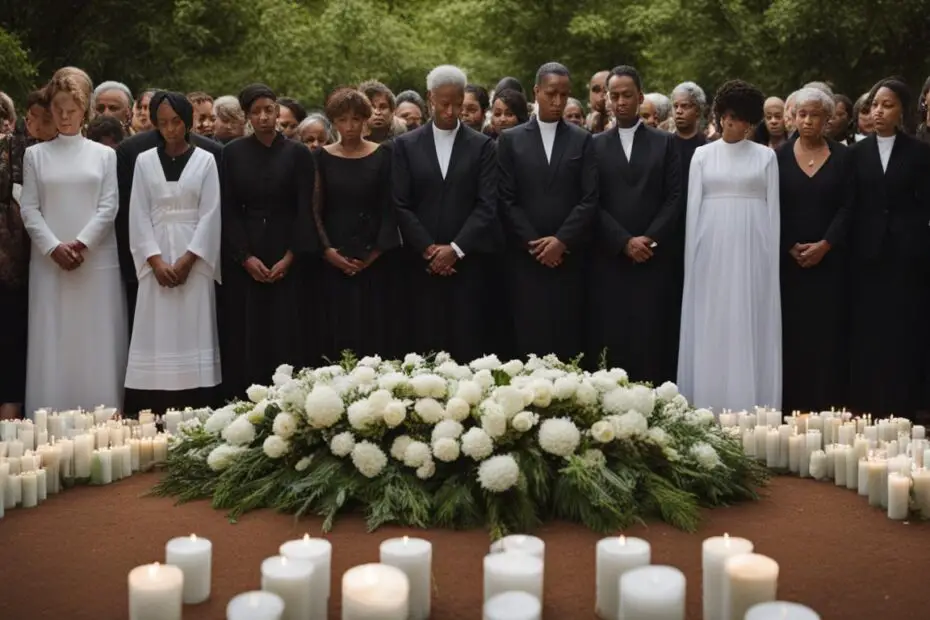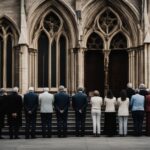Planning a funeral for an unbeliever, someone who did not practice any specific religion or identified as Atheist or Agnostic, can be a sensitive and deeply personal task. In a time of grief, it is important to create a service that respects the beliefs and values of the deceased. Non-religious funeral prayers provide meaningful and inclusive options for honoring the life of an unbeliever.
Whether you are arranging a funeral for a loved one or seeking guidance on non-religious funeral options, this article aims to provide you with the necessary insight and inspiration. From the funeral format to readings and donations, we will explore the various aspects of creating a respectful and personalized funeral service for unbelievers.
Key Takeaways:
- Non-religious funeral services offer respectful options for honoring unbelievers.
- Funeral etiquette for non-religious services requires respectful behavior and appropriate attire.
- The funeral format may include personalized elements, such as non-religious readings and music.
- Green burials align with non-religious values by prioritizing environmental sustainability.
- Donations to charity and non-religious tributes are meaningful ways to honor the deceased.
Non-Religious Funeral Etiquette
When attending a non-religious funeral service, it is important to remember that the focus is on honoring and remembering the deceased in a way that is meaningful to their beliefs and values. Here are some guidelines for observing non-religious funeral etiquette:
- Dress respectfully: Regardless of religious beliefs, it is important to dress in a conservative and respectful manner. Avoid wearing overly casual or revealing clothing, opting instead for attire suitable for a solemn occasion.
- Respect the mood: The atmosphere at a non-religious funeral service may vary, depending on the wishes of the family. Some ceremonies may be somber and reflective, while others may be more celebratory, highlighting the life and accomplishments of the deceased. Take cues from the family and friends and adjust your behavior accordingly.
- Show empathy: Express your condolences and offer support to the grieving family and friends. Even if you didn’t know the deceased well, your presence and kind words can provide comfort during this difficult time.
- Participate respectfully: During the service, follow the lead of the family and officiant. If there are readings, music, or other rituals, observe them with reverence, even if they differ from your personal beliefs. Non-religious funeral services often include elements that reflect the individuality of the deceased, so be open to experiencing something unique and meaningful.
Remember, the purpose of a non-religious funeral service is to honor the life and memory of the deceased in a way that is respectful and inclusive. By demonstrating empathy, dressing appropriately, and participating with respect, you can contribute to creating a meaningful and supportive environment for all attendees.
Table: Funeral Etiquette Dos and Don’ts
| Do | Don’t |
|---|---|
| Express your condolences to the family | Make insensitive comments or jokes |
| Dress in conservative and respectful attire | Wear overly casual or revealing clothing |
| Follow the lead of the family and officiant | Disrupt the ceremony by talking or using electronic devices |
| Show empathy and support | Focus on your own needs or emotions |
| Participate respectfully in readings and rituals | Disrespect or criticize the beliefs of others |
By adhering to these etiquette guidelines, you can help create an atmosphere of respect and support at a non-religious funeral service. Remember, the purpose of the service is to honor the memory and celebrate the life of the deceased, regardless of their religious beliefs.
Funeral Format & Displaying the Deceased
Non-religious funeral services offer a unique format that allows for personalization and the inclusion of elements that reflect the life and beliefs of the deceased. These services typically follow a structured sequence of events, providing an opportunity for friends and family to pay their respects and remember the individual in a meaningful way.
One of the key components of a non-religious funeral is the inclusion of stories and eulogies from friends and family members. This allows loved ones to share memories and anecdotes that celebrate the life and personality of the deceased, providing comfort and healing for those in attendance.
Non-traditional music is also commonly featured in non-religious funeral services. This may include the deceased’s favorite songs, music that reflects their personality or interests, or instrumental pieces that create a reflective and introspective atmosphere. The music chosen should be respectful and appropriate for the occasion.
Displaying the deceased in a non-religious funeral can take various forms. It may include an open or closed casket, with the choice depending on the preferences of the family or the wishes of the deceased. In some cases, the ashes of the deceased may be present in a ceremonial urn. The display should be arranged in a way that honors the individual and allows mourners to pay their respects.
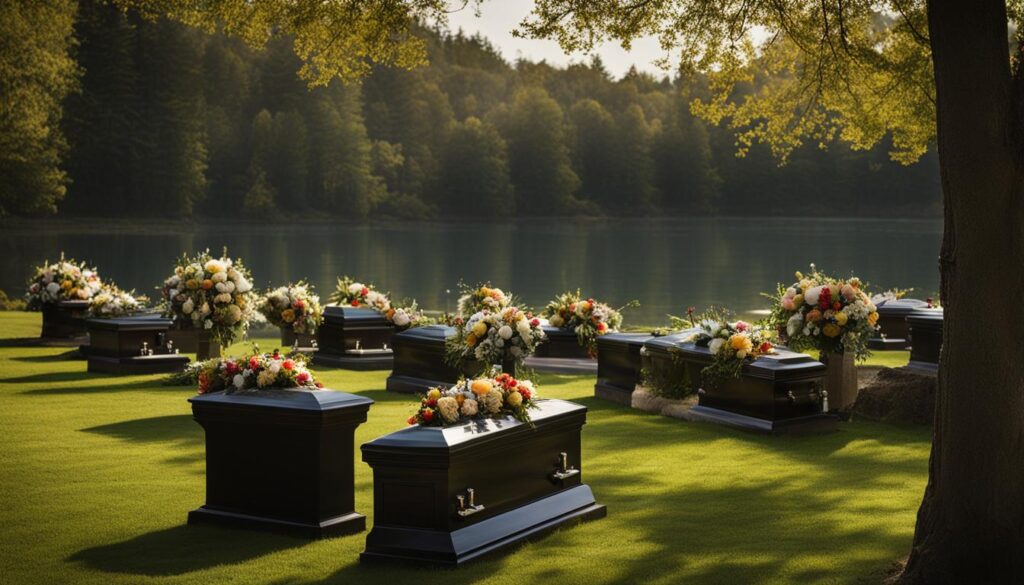
Incorporating Non-Religious Funeral Readings
In addition to personal stories and eulogies, non-religious funeral services often include readings that provide comfort, inspiration, and reflection. These readings can come from a variety of sources, such as poetry, literature, or philosophical works, and should be chosen to resonate with the beliefs and values of the deceased.
Non-religious funeral readings can be selected based on the individual’s interests, favorite authors, or meaningful passages that embody their life philosophy. The readings should be carefully chosen to ensure they are respectful, inclusive, and appropriate for the occasion.
By incorporating non-religious funeral readings, the service becomes a celebration of the individual’s life, providing an opportunity for mourners to find solace and inspiration in the words shared. These readings help create a meaningful and memorable experience that honors the deceased in a way that is true to their beliefs and values.
Green Burials
As the world becomes increasingly aware of environmental concerns, the concept of green burials has gained significant traction. Green burials, also known as eco-burials or natural burials, offer a sustainable and nature-oriented approach to laying our loved ones to rest. These eco-friendly practices align with the values of non-religious funeral services, placing emphasis on minimizing the impact on the environment.
Green burials incorporate various environmentally conscious elements, such as the use of biodegradable coffins or shrouds made from natural materials like bamboo or wicker. These eco-friendly alternatives ensure that the burial process has a minimal ecological footprint, allowing for a more sustainable end-of-life journey.
“The earth does not belong to us; we belong to the earth.” – Chief Seattle
In addition to the choice of coffin, green burials also prioritize prompt burials within 24-48 hours of death, eliminating the need for embalming and reducing the use of harmful chemicals. This natural approach allows the body to return to the earth more swiftly, promoting a more seamless integration with the environment.
| Benefits of Green Burials | Traditional Burials |
|---|---|
| Minimizes environmental impact | May involve embalming and non-biodegradable materials |
| Promotes conservation of natural resources | May require land excavation and use of concrete vaults |
| Provides a more natural and peaceful resting place | Often characterized by manicured lawns and headstones |
| Offers a more affordable option | Can be costly due to the need for elaborate caskets and grave markers |
By choosing green burials, individuals and their families can make a positive impact on the environment while honoring their loved ones’ wishes for a more natural and sustainable farewell.
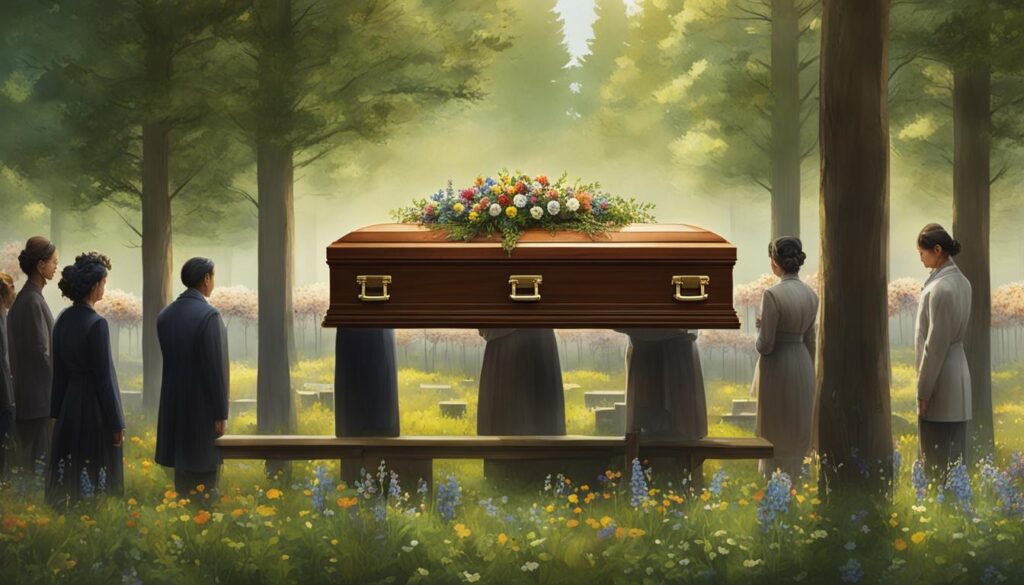
Donations
One meaningful way to honor the deceased during a non-religious funeral is by making charitable contributions. Donating to a cause or organization that was important to the departed can create a lasting impact and serve as a tribute to their life. Whether it’s a charitable foundation, a local community project, or a cause close to their heart, donations can make a difference in the lives of others in memory of the loved one.
Another thoughtful option to consider is sending sympathy gifts, such as potted plants. These living tributes can symbolize life, growth, and resilience. Potted plants can be a lasting reminder of the deceased, providing comfort and solace to the grieving family. Opting for organic flowers is also a way to prioritize environmentally friendly choices during the funeral service.
“The best way to find yourself is to lose yourself in the service of others.” – Mahatma Gandhi
Non-religious funerals often emphasize the value of community and compassion. By choosing to make donations or sending tribute gifts, attendees can not only honor the memory of the departed but also extend support and care to those in need.
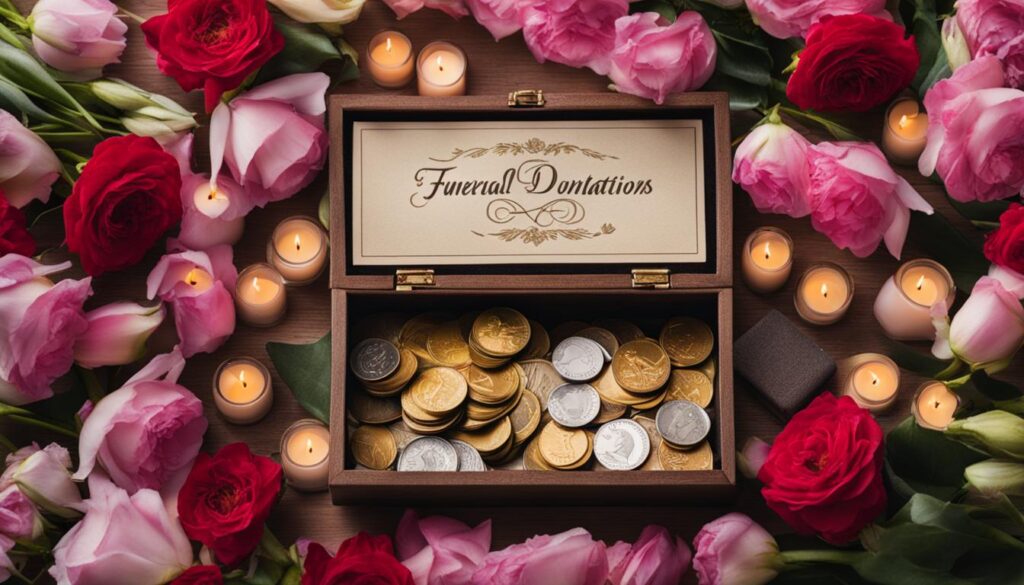
Donation Options
| Charitable Organization | Description |
|---|---|
| XYZ Foundation | The XYZ Foundation supports various causes, including education, healthcare, and environmental conservation. |
| Local Community Center | Contribute to a local community center that offers programs and resources to support underserved individuals and families. |
| Animal Shelter | Support an animal shelter or rescue organization that provides care and shelter for abandoned or mistreated animals. |
In addition to monetary donations, consider volunteering your time and skills to organizations that align with the values of the deceased. Non-religious funerals offer an opportunity to celebrate a life well-lived and continue their legacy through acts of kindness and compassion.
Funeral Celebrant & Venue
When planning a non-religious funeral, the choice of a funeral celebrant is an important decision. A funeral celebrant is someone who leads and officiates the funeral service, ensuring that it is personalized and meaningful to the family and friends of the deceased. The celebrant can be anyone deemed suitable by the family, whether it be a family member or a respected member of the community.
The role of the funeral celebrant is to create a ceremony that reflects the life and values of the deceased. They work closely with the family to gather information about the person who has passed away, ensuring that the service is a true reflection of their personality, beliefs, and accomplishments. The celebrant can incorporate personalized elements such as stories, music, and readings that hold significance to the family.
Another important aspect of planning a non-religious funeral is choosing the venue. Since non-religious funerals do not take place in a religious institution, the venue can be personalized and held anywhere designated by the family. This could include favorite locations of the deceased, community centers, parks, or even religious chapels if desired. The freedom to choose a non-religious venue allows for a more unique and personalized experience that truly honors the life of the deceased.
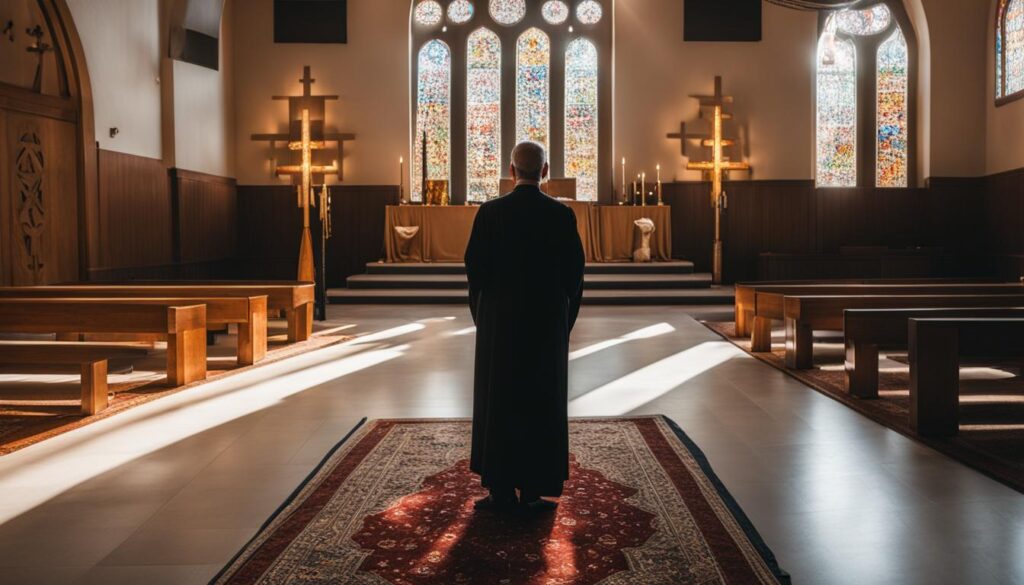
Table: Comparison of Funeral Celebrant and Religious Officiant
| Funeral Celebrant | Religious Officiant |
|---|---|
| Creates personalized ceremonies | Follows traditional religious rituals |
| Focuses on celebrating the life of the deceased | Emphasizes religious beliefs and doctrines |
| Provides flexibility in choosing the venue | Usually held in a religious institution |
| Can incorporate non-religious elements | Follows specific religious customs |
| Works closely with the family to gather information | May or may not have personal connection to the deceased |
“A funeral celebrant’s role is to create a personalized ceremony that truly reflects the life of the deceased and provides comfort to the family and friends. This allows for a unique and meaningful farewell that celebrates the individual’s life and honors their beliefs and values.” – Funeral Celebrant John Smith
Non-Religious Funeral Readings
Non-religious funeral readings are an essential component of a non-religious funeral service, providing an opportunity to honor and remember the deceased in a way that is meaningful and relevant to their beliefs and values. These readings can take the form of poems, prose, or personalized tributes that reflect the life and experiences of the departed.
One popular option for non-religious funeral readings is to choose works from well-known poets and writers who explore themes of love, loss, and the human experience. Poets such as Maya Angelou, Emily Dickinson, and Mary Oliver have written beautiful and poignant pieces that can bring comfort and solace to mourners.
Additionally, non-religious funeral readings can be tailored to the individual, incorporating personal stories, anecdotes, and memories shared by friends and family. These readings provide a unique and intimate perspective on the life of the deceased, creating a heartfelt and authentic tribute. It is important to ensure that the readings selected do not contain religious references, as the focus of the service is on celebrating the life and legacy of the individual in a religiously neutral manner.
“The love and memories we shared will forever be etched in our hearts. Though we gather here today with sadness in our hearts, let us also remember the joy and laughter that [Name] brought into our lives. May their spirit continue to inspire us as we navigate this world without them.”
Table: Examples of Non-Religious Funeral Readings
| Author | Title |
|---|---|
| Maya Angelou | When Great Trees Fall |
| Emily Dickinson | Because I could not stop for Death |
| Mary Oliver | When Death Comes |
Non-religious funeral readings provide an opportunity to create a personalized and meaningful tribute for the departed. Whether drawing from the works of renowned poets or sharing personal stories, these readings serve as a powerful way to celebrate the life and legacy of the deceased, while providing comfort and solace to mourners.
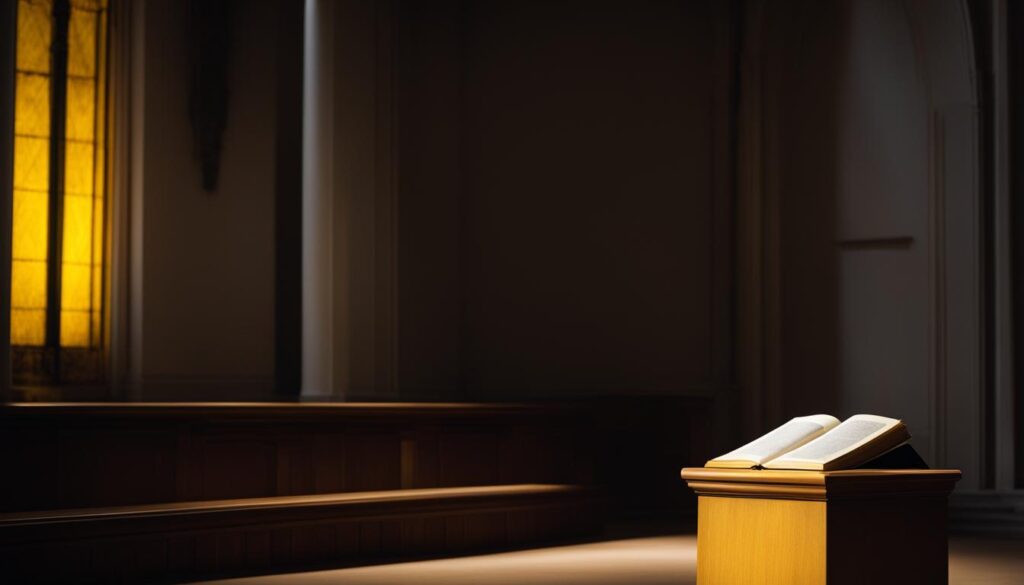
The Minister’s Duty
When a death occurs in a minister’s congregation, their immediate duty is to offer sympathy and consolation to the bereaved family. The minister plays a vital role in providing emotional support during a time of grief and loss. They offer guidance, comfort, and a listening ear to those who are mourning.
In addition to providing emotional support, the minister is also responsible for taking charge of the funeral arrangements if requested by the family. This includes coordinating with the funeral director, gathering information about the deceased to create a meaningful service, and ensuring that the family’s wishes are respected.
The minister’s role extends to leading the funeral service itself. They may offer prayers, read scripture passages, or share reflections on the life of the deceased. It is their duty to create a sacred and reverent atmosphere that honors the memory of the departed and provides solace to the grieving family and friends.
The minister’s presence and guidance throughout the funeral process can bring comfort and reassurance to those who are mourning. Their compassionate support and spiritual leadership help create a memorable and meaningful farewell for the deceased.
| Minister’s Duty in Funerals | Responsibilities |
|---|---|
| Offering Sympathy | Providing emotional support to the bereaved family and offering condolences. |
| Funeral Arrangements | Coordinating with the funeral director and gathering information about the deceased to create a meaningful service. |
| Leading the Funeral Service | Providing spiritual guidance, leading prayers or readings, and creating a reverent atmosphere. |
The Funeral Director’s Duties
The role of a funeral director in organizing and coordinating a funeral service is of utmost importance. They work closely with ministers and families to ensure that all aspects of the funeral logistics are taken care of with professionalism and compassion.
“The funeral director’s duty is to provide guidance and support in a time of grief while handling the practical aspects of the funeral service.”
One of the primary responsibilities of a funeral director is to liaise with the minister who will be conducting the service. They work together to ensure that the funeral arrangements align with the wishes of the family and meet any specific religious or cultural requirements.
The funeral director is also responsible for managing the logistics of the funeral service. This includes organizing the order of the service, coordinating transportation for the deceased, and overseeing the setup of the funeral venue. They ensure that everything runs smoothly and that the atmosphere is respectful and dignified.
Additionally, the funeral director provides support to the family, offering guidance on important decisions, such as choosing the right casket or urn, arranging floral tributes, and handling the necessary paperwork. They understand the sensitive nature of funerals and strive to create a comforting and meaningful experience for all involved.
Table: The Funeral Director’s Duties
| Responsibilities | Description |
|---|---|
| Liaising with ministers | Coordinating with the minister to ensure the funeral arrangements align with the family’s wishes and any specific religious or cultural requirements. |
| Logistics management | Organizing the order of the service, coordinating transportation for the deceased, and overseeing the setup of the funeral venue. |
| Support and guidance | Providing support to the family in making decisions regarding the choice of casket or urn, floral tributes, and handling necessary paperwork. |
The funeral director’s role is vital in ensuring that the funeral service is conducted with the utmost care and respect. Their ability to coordinate with ministers and attend to the logistics of the funeral allows the family to focus on grieving and honoring their loved one.
In summary, the funeral director plays a crucial role in coordinating with ministers and managing the logistics of the funeral service. They provide guidance and support to the family, ensuring that all arrangements are carried out with professionalism and compassion. The funeral director’s dedication and attention to detail contribute to creating a meaningful and dignified farewell for the deceased.
Conclusion
Funeral prayers for unbelievers can be conducted with utmost respect and inclusivity, providing a meaningful way to honor and remember the deceased. Non-religious funeral services offer a personalized and compassionate approach, regardless of the individual’s religious beliefs. It is crucial for ministers, funeral directors, and attendees to approach these services with sensitivity and compassion, creating an environment of understanding and support.
By embracing non-religious funeral options, we can honor the wishes of those who did not practice a specific religion or identified as Atheist or Humanist. These services provide a platform to reflect on the life of the departed, share stories and memories, and find solace in the company of loved ones.
Choosing respectful funeral options for unbelievers allows us to celebrate the unique journey of each individual, respecting their beliefs and values throughout the final farewell. Above all, it is the empathy, compassion, and love we bring to these services that truly make them meaningful and memorable.
FAQ
What is a non-religious funeral service?
A non-religious funeral service is a suitable option for those who did not practice any specific religion or identified as Atheist or Humanist. The format of the funeral is usually based on the wishes of the deceased or their family.
How should guests behave at a non-religious funeral service?
Guests attending a non-religious funeral service should behave respectfully and in a manner typical of any funeral service, regardless of religious affiliation. The general mood may be somber or celebratory, depending on the wishes of the family. Proper dress attire should be conservative and respectful.
What is the format of a non-religious funeral service?
Non-religious funeral services often follow a similar format, including an opening statement, stories from friends and family, a eulogy, a moment of silence or meditation, and music. The deceased may be displayed in an open or closed casket, or their ashes may be present in a ceremonial urn. Non-religious funeral readings and personalized elements are common.
What are green burials?
Green burials prioritize environmental sustainability. These burials often involve the use of biodegradable coffins, a quick burial within 24-48 hours of death, and the omission of embalming. Green burials align with the non-religious focus on nature and minimize the impact on the environment.
How can I honor the deceased at a non-religious funeral?
Donating to charity is a meaningful way to honor the deceased, regardless of their beliefs. Other options for honoring the deceased include delivering a tribute to their life or sending sympathy gifts such as potted plants. Non-religious funerals may prioritize environmentally friendly options, such as locally sourced and organic flowers.
Who can be the funeral celebrant for a non-religious funeral?
The choice of a funeral celebrant for a non-religious funeral can be anyone deemed suitable by the family, whether it be a family member or a respected member of the community. The venue for a non-religious funeral can be personalized and held anywhere designated by the family, including religious chapels if desired.
What role do non-religious funeral readings play?
Non-religious funeral readings play a crucial role in bringing everyone together during the ceremony. Famous works of prose, poetry, or personalized readings can be incorporated to commemorate the deceased and provide comfort to the mourners. These readings should not contain religious references and should reflect the non-religious nature of the service.
What is the minister’s duty in a non-religious funeral?
When a death occurs in a minister’s congregation, their immediate duty is to offer sympathy and consolation to the bereaved family. If asked to take charge of the funeral, the minister should gather information about the deceased to provide a meaningful service. They should also coordinate with the family regarding preferences for music and other elements of the service.
What are the funeral director’s duties in a non-religious funeral?
The funeral director plays a crucial role in coordinating with the minister and ensuring a smooth and dignified funeral service. They are responsible for practical aspects such as the order of the service, transportation of the deceased, and managing the funeral venue. There should be complete cooperation between the minister and funeral director to create a dignified and respectful experience.
Can non-religious funeral services include prayers?
Funeral prayers for unbelievers can be conducted with respect and inclusivity. Non-religious funeral services offer a personalized and meaningful way to honor and remember the deceased, regardless of their religious beliefs. It is important for ministers, funeral directors, and attendees to approach these services with sensitivity and compassion.


